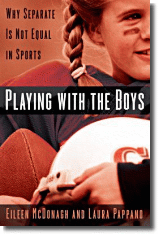 Eileen McDonagh is Professor of Political Science at Northeastern University and Visiting Scholar at the Institute for Quantitative Social Science at Harvard University. She is the author of Breaking the Abortion Deadlock. Laura Pappano is the author of The Connection Gap and an award-winning journalist whose work has appeared in The New York Times, The Boston Globe Magazine, Good Housekeeping, and The Washington Post. Their new book is Playing With the Boys: Why Separate is Not Equal in Sports.
Eileen McDonagh is Professor of Political Science at Northeastern University and Visiting Scholar at the Institute for Quantitative Social Science at Harvard University. She is the author of Breaking the Abortion Deadlock. Laura Pappano is the author of The Connection Gap and an award-winning journalist whose work has appeared in The New York Times, The Boston Globe Magazine, Good Housekeeping, and The Washington Post. Their new book is Playing With the Boys: Why Separate is Not Equal in Sports.Pappano applied the "Page 99 Test" to Playing With The Boys and reported the following:
In Playing with the Boys, Eileen and I try to make a point we think is obvious, but that riles people: Sports are not just for guys, not just for fun, and not just so much background yammering (though sports talk radio sure sounds that way), but a social force that doesn’t merely reflect sex differences, but imposes them.Learn more about Playing With The Boys at the Oxford University Press website.
When I applied the Page 99 test to the book, I landed under “Sex Authenticity.” I’m not sure it reveals “the quality of the whole” but it gets at two central ideas. The first is how itchy “sex” issues make people who want strict gender roles and rules. The second is that we’re still debating the same issue, but now it's sports instead of jobs.
In this section, we explore the shock in the 1970s when courts decided companies couldn’t any longer have sex-segregated job ads under headings like “male” and “female.” Just before this, we give space to “the bunny problem” – as a 1965 The Wall Street Journal article puzzled over what would happen now that males and females had to be given equal access to job opportunities. The writer fretted about a “shapeless knobby-kneed male ‘bunny’ serving drinks to a group of stunned businessmen in a Playboy Club.” The writer also envisioned “a matronly vice president gleefully participating in an old office sport by chasing a male secretary around a big leather-topped desk.” (Did this stuff really happen?)
We offer a fly-over of the government’s struggle to figure out when sex does (and doesn’t) matter. They came up with the Bona Fide Occupational Qualification (BFOQ) with “Sex Authenticity,” the escape clause that let employers hire women only or men only for certain jobs (think wet nurse). Today, the look back is amusing, revealing – and relevant to the debate about when an athlete’s sex should (or shouldn’t) matter. Why don’t super-power-kicking female athletes become punters and field goal kickers? Why are there different rules for males and females when it’s not about physical difference (men go to 15 in badminton and women go to 11?) Why does Rutgers charge $7 to see men’s soccer and $4 to see women’s (when they’re not trying to make money)?
Just like when the boss could demand a “Gal Friday” but not a “Guy Friday,” we have gender equality work to do in our athletic in-box.
--Marshal Zeringue



